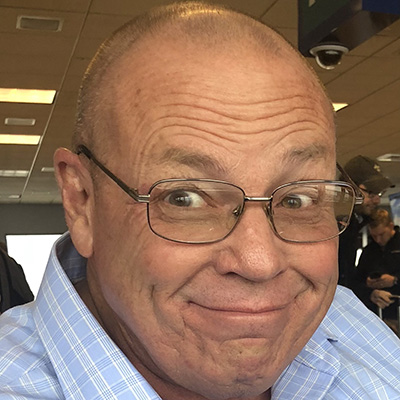
The Truth Makes the Best Story
Randy Evensen’s favorite storytelling audience is his grandchildren—especially when they’re around a campfire. And, since his retirement from teaching first and second grades, he’s been telling stories at local elementary schools every week. He loves that. “It’s just been fun. I love to come in and get a kid fix!” Evensen said.
Randy is 66 years old with eight children and 16 grandchildren, and has taught school for 35 years. This year will be Randy’s first time telling at the Timpanogos Storytelling Festival, though he told a story at the National Storytelling Festival’s Story Slam and has attended Timpanogos since its second year. Evensen believes in the uniting power of stories. “Anytime we can help people think of experiences and share their stories, that’s a good thing,” he said. “Most of my stories are personal family stories.”
Evensen idolizes Donald Davis and has been attending Donald’s storytelling workshop for years. “He (Davis) is the epitome of a storyteller,” Evensen said. “I love real stories with real consequences. I’ve been telling stories since I was kid, but I never wrote those stories down until I found Story Worth. It has been a wonderful, year-long project. Now all of my stories are in print.”
“Eighty-five percent of the stories I tell are about my childhood growing up in West Point, Utah,’’ Randy says. “In West Point during the 1950s, everyone knew everyone else. No one was afraid to pull you by the ear and drag you back home to your mom when you did something you shouldn’t have done. The other fifteen percent of my stories come from my ancestors, particularly my Grandma Emerald—my favorite person and closest companion in crime. I grew up in a family of ten. That was a huge blessing because my mom didn’t always know where I was or what I was up to. This led to some great stories.’’
When Evensen comes to an event, he takes time to visit with people before the storytelling begins. “I come to a storytelling event with something in mind, but I love to listen to the other tellers and talk to people before the event begins. I often choose stories that have been sparked by my conversation or stories I’ve heard prior to my set. It’s almost like a fun game I play before I stand up to tell. I think choosing the story is half the fun of telling. I’m always hoping my story will connect with the listener.”
Evensen says storytelling is reciprocal. “I give a story to the audience and they give back to me in the way they listen and respond. People who are engaged in stories are always changed—whether they are the teller or the listener. Stories are powerful. A story opens the door and invites us to come in. It welcomes us to make ourselves at home . . . and most of us do. We put ourselves in the story or a similar story that comes into our head. After experiencing someone else’s story, we are changed. As a teller, I feel that change in the listeners and we all come away changed.”
As for the types of stories most dear to Randy’s heart, he says, “I very seldom tell a scary story. The world needs to laugh. Anytime I can share a story that helps us forget our cares and burdens for just a few minutes, I’m all in. Let’s laugh every chance we get. I also like to stay true to the experience. The truth always gets the best laughs.”

